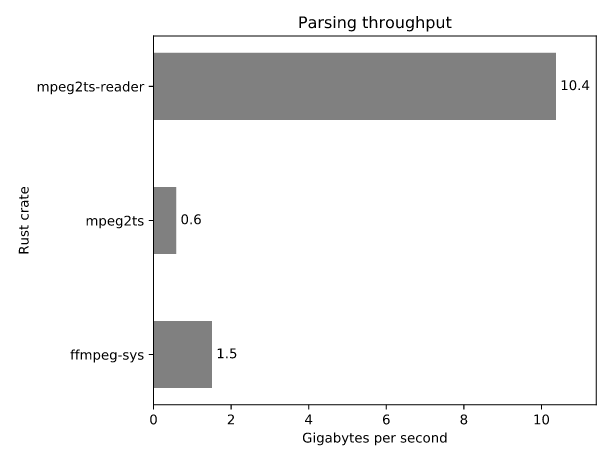15个重大版本发布
| 0.16.0 | 2024年2月20日 |
|---|---|
| 0.15.0 | 2021年4月17日 |
| 0.14.0 | 2021年4月10日 |
| 0.13.0 | 2019年7月1日 |
| 0.2.0 | 2018年3月15日 |
#13 in 视频
569次每月下载
用于 5 crates
240KB
4K SLoC
mpeg2ts-reader
Rust编写的MPEG2传输流数据读取器
对MPEG传输流中的有效负载数据实现零拷贝访问。
本crate,
- 实现了一个低级状态机,能够识别传输流语法的结构元素
- 提供了你应实现的特性,以定义你应用特定的数据处理。
示例
将H264有效负载数据以十六进制形式输出。
#[macro_use]
extern crate mpeg2ts_reader;
extern crate hex_slice;
use hex_slice::AsHex;
use mpeg2ts_reader::demultiplex;
use mpeg2ts_reader::packet;
use mpeg2ts_reader::pes;
use mpeg2ts_reader::psi;
use mpeg2ts_reader::StreamType;
use std::cmp;
use std::env;
use std::fs::File;
use std::io::Read;
// This macro invocation creates an enum called DumpFilterSwitch, encapsulating all possible ways
// that this application may handle transport stream packets. Each enum variant is just a wrapper
// around an implementation of the PacketFilter trait
packet_filter_switch! {
DumpFilterSwitch<DumpDemuxContext> {
// the DumpFilterSwitch::Pes variant will perform the logic actually specific to this
// application,
Pes: pes::PesPacketFilter<DumpDemuxContext,PtsDumpElementaryStreamConsumer>,
// these definitions are boilerplate required by the framework,
Pat: demultiplex::PatPacketFilter<DumpDemuxContext>,
Pmt: demultiplex::PmtPacketFilter<DumpDemuxContext>,
// this variant will be used when we want to ignore data in the transport stream that this
// application does not care about
Null: demultiplex::NullPacketFilter<DumpDemuxContext>,
}
}
// This macro invocation creates a type called DumpDemuxContext, which is our application-specific
// implementation of the DemuxContext trait.
demux_context!(DumpDemuxContext, DumpFilterSwitch);
// When the de-multiplexing process needs to create a PacketFilter instance to handle a particular
// kind of data discovered within the Transport Stream being processed, it will send a
// FilterRequest to our application-specific implementation of the do_construct() method
impl DumpDemuxContext {
fn do_construct(&mut self, req: demultiplex::FilterRequest<'_, '_>) -> DumpFilterSwitch {
match req {
// The 'Program Association Table' is is always on PID 0. We just use the standard
// handling here, but an application could insert its own logic if required,
demultiplex::FilterRequest::ByPid(packet::Pid::PAT) => {
DumpFilterSwitch::Pat(demultiplex::PatPacketFilter::default())
}
// 'Stuffing' data on PID 0x1fff may be used to pad-out parts of the transport stream
// so that it has constant overall bitrate. This causes it to be ignored if present.
demultiplex::FilterRequest::ByPid(packet::Pid::STUFFING) => {
DumpFilterSwitch::Null(demultiplex::NullPacketFilter::default())
}
// Some Transport Streams will contain data on 'well known' PIDs, which are not
// announced in PAT / PMT metadata. This application does not process any of these
// well known PIDs, so we register NullPacketFiltet such that they will be ignored
demultiplex::FilterRequest::ByPid(_) => {
DumpFilterSwitch::Null(demultiplex::NullPacketFilter::default())
}
// This match-arm installs our application-specific handling for each H264 stream
// discovered within the transport stream,
demultiplex::FilterRequest::ByStream {
stream_type: StreamType::H264,
pmt,
stream_info,
..
} => PtsDumpElementaryStreamConsumer::construct(pmt, stream_info),
// We need to have a match-arm to specify how to handle any other StreamType values
// that might be present; we answer with NullPacketFilter so that anything other than
// H264 (handled above) is ignored,
demultiplex::FilterRequest::ByStream { .. } => {
DumpFilterSwitch::Null(demultiplex::NullPacketFilter::default())
}
// The 'Program Map Table' defines the sub-streams for a particular program within the
// Transport Stream (it is common for Transport Streams to contain only one program).
// We just use the standard handling here, but an application could insert its own
// logic if required,
demultiplex::FilterRequest::Pmt {
pid,
program_number,
} => DumpFilterSwitch::Pmt(demultiplex::PmtPacketFilter::new(pid, program_number)),
// Ignore 'Network Information Table', if present,
demultiplex::FilterRequest::Nit { .. } => {
DumpFilterSwitch::Null(demultiplex::NullPacketFilter::default())
}
}
}
}
// Implement the ElementaryStreamConsumer to just dump and PTS/DTS timestamps to stdout
pub struct PtsDumpElementaryStreamConsumer {
pid: packet::Pid,
len: Option<usize>,
}
impl PtsDumpElementaryStreamConsumer {
fn construct(
_pmt_sect: &psi::pmt::PmtSection,
stream_info: &psi::pmt::StreamInfo,
) -> DumpFilterSwitch {
let filter = pes::PesPacketFilter::new(PtsDumpElementaryStreamConsumer {
pid: stream_info.elementary_pid(),
len: None,
});
DumpFilterSwitch::Pes(filter)
}
}
impl pes::ElementaryStreamConsumer for PtsDumpElementaryStreamConsumer {
fn start_stream(&mut self) {}
fn begin_packet(&mut self, header: pes::PesHeader) {
match header.contents() {
pes::PesContents::Parsed(Some(parsed)) => {
match parsed.pts_dts() {
Ok(pes::PtsDts::PtsOnly(Ok(pts))) => {
print!("{:?}: pts {:#08x} ", self.pid, pts.value())
}
Ok(pes::PtsDts::Both {
pts: Ok(pts),
dts: Ok(dts),
}) => print!(
"{:?}: pts {:#08x} dts {:#08x} ",
self.pid,
pts.value(),
dts.value()
),
_ => (),
}
let payload = parsed.payload();
self.len = Some(payload.len());
println!(
"{:02x}",
payload[..cmp::min(payload.len(), 16)].plain_hex(false)
)
}
pes::PesContents::Parsed(None) => (),
pes::PesContents::Payload(payload) => {
self.len = Some(payload.len());
println!(
"{:?}: {:02x}",
self.pid,
payload[..cmp::min(payload.len(), 16)].plain_hex(false)
)
}
}
}
fn continue_packet(&mut self, data: &[u8]) {
println!(
"{:?}: continues {:02x}",
self.pid,
data[..cmp::min(data.len(), 16)].plain_hex(false)
);
self.len = self.len.map(|l| l + data.len());
}
fn end_packet(&mut self) {
println!("{:?}: end of packet length={:?}", self.pid, self.len);
}
fn continuity_error(&mut self) {}
}
fn main() {
// open input file named on command line,
let name = env::args().nth(1).unwrap();
let mut f = File::open(&name).expect(&format!("file not found: {}", &name));
// create the context object that stores the state of the transport stream demultiplexing
// process
let mut ctx = DumpDemuxContext::new();
// create the demultiplexer, which will use the ctx to create a filter for pid 0 (PAT)
let mut demux = demultiplex::Demultiplex::new(&mut ctx);
// consume the input file,
let mut buf = [0u8; 188 * 1024];
loop {
match f.read(&mut buf[..]).expect("read failed") {
0 => break,
n => demux.push(&mut ctx, &buf[0..n]),
}
}
}
性能竞赛
比较此crate与其他几个你可能用于读取传输流的crate —— mpeg2ts 和 ffmpg-sys
产生上述图表数据的基准测试在shootout 文件夹中。(如果基准测试给出了不公正的性能比较,那是一个错误 —— 请提交bug!)
测试条件为,
- 数据已在内存中(无网络/磁盘访问)
- 测试数据集大于CPU缓存
- 处理发生在单个核心上(无流的多进程)
支持的传输流功能
并非所有传输流功能都得到支持。以下是可用功能的摘要以及尚未到来功能
- 封装
- ISO/IEC 13818-1 188字节包
- m2ts 192字节包(如果外部crate能支持的话,那会很好)
- 同步丢失后的恢复
- 传输流包
- 固定头部
- 适配字段
- TS级加扰(除
0以外的transport_scrambling_control值)不受支持
- 节目特定信息表
- 部分语法
- ‘多部分’表
- PAT - 程序关联表
- 节目映射表(PMT)
- 传输流描述表(TSDT)
- 分组基本流语法
- PES分组数据
- PTS/DTS
- ESCR
- ES速率
- DSM技巧模式
- 附加复制信息
- PES循环冗余校验(CRC)
- PES扩展
- 描述符
- 视频流描述符
- 音频流描述符
- 层次描述符
- 注册描述符
- 数据流对齐描述符
- 目标背景网格描述符
- 视频窗口描述符
- 条件接收(CA)描述符
- ISO 639语言描述符
- 系统时钟描述符
- 复用缓冲区利用率描述符
- 版权描述符
- 最大比特率描述符
- 私有数据指示符描述符
- 平滑缓冲区描述符
- 标准描述符
- IBP描述符
- MPEG4视频描述符
- MPEG4音频描述符
- IOD描述符
- SL描述符
- FMC描述符
- 外部ES ID描述符
- MUX码描述符
- FMX缓冲区大小描述符
- 复用缓冲区描述符
- AVC视频描述符
依赖关系
~2.5MB
~34K SLoC
